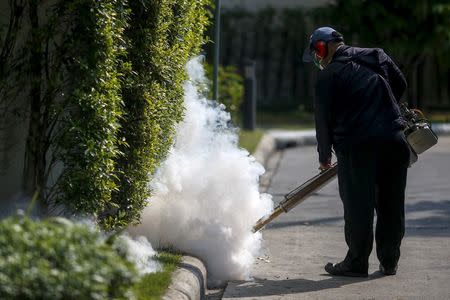Hawaii Biotech joins race to develop Zika vaccine
By Natalie Grover and Amrutha Penumudi (Reuters) - Privately owned vaccine developer Hawaii Biotech Inc has joined the race to produce a vaccine for the mosquito-borne Zika virus, a fast-spreading infection which has been linked to severe birth defects in babies. The company initiated a formal program to test a Zika vaccine last fall, as the virus began to gain traction in Brazil, said Chief Executive Dr. Elliot Parks. "Right now, we are in the pre-clinical stage, as I suspect everyone is," Parks, a former Johnson & Johnson executive, told Reuters in an interview late on Thursday. The World Health Organization (WHO) has said the Zika virus is "spreading explosively" and could infect as many as 4 million people in the Americas. There is no proven vaccine or treatment. Although a direct causal relationship has not been established, a link is strongly suspected between Zika and thousands of children born in Brazil with abnormally small heads, brain defects and impaired vision. A close cousin of dengue and chikungunya, Zika causes mild fever and rash. But an estimated 80 percent of those infected suffer no symptoms, making it difficult for pregnant women to know whether they have been infected. "We will have data coming through this year," Parks said. "When we enter the clinic is yet to be determined." The United States has two potential candidates for a Zika vaccine and may begin clinical trials in people by the end of this year, but there will not be a widely available vaccine for several years, U.S. officials said on Thursday. Canadian scientist Gary Kobinger, who helped develop a trial vaccine that was successful in fighting Ebola, is part of a consortium working on a Zika vaccine that could be ready for emergency use before the end of the year. This week, GlaxoSmithKline Plc also said it was concluding studies to check whether its technology is suitable for the virus. Parks and his team at Hawaii Biotech are initially funding development themselves, while looking ultimately to partner with a big player that would have the ability to deliver a vaccine worldwide. The Honolulu, Hawaii-based company, which is also testing vaccines for infectious diseases including West Nile virus and chikungunya, sold its early-stage dengue vaccine candidate to Merck & Co Inc in 2010. It also has a tick-borne encephalitis virus vaccine in the pre-clinical stage, funded by a grant from the infectious disease arm of the National Institutes of Health. (Reporting by Natalie Grover and Amrutha Penumudi in Bengaluru; Editing by Robin Paxton)

 Yahoo News
Yahoo News 



